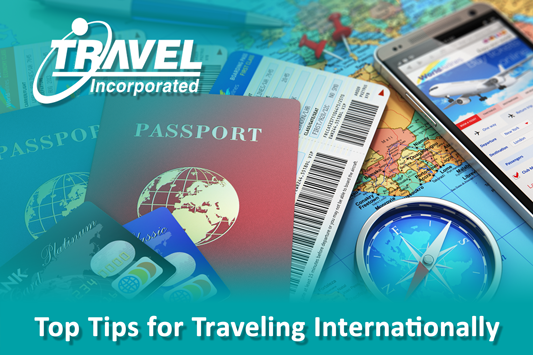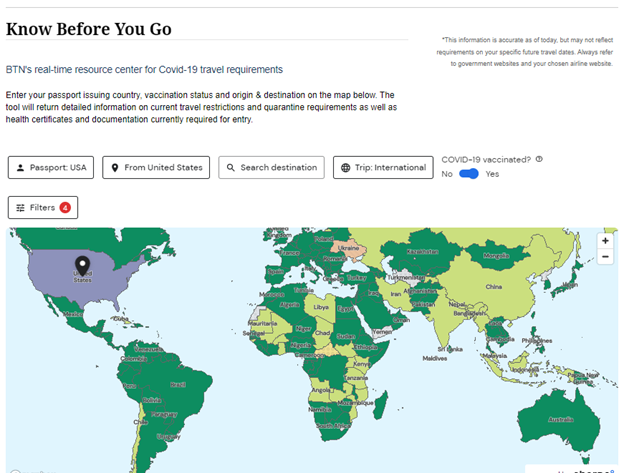Top Tips
for Traveling
Internationally
The world is open for business and airline routes continue to expand. While travelers are ready to resume their international travel, traveling internationally is anything but routine.
The world is open for business and airline routes continue to expand. While travelers are ready to resume their international travel, traveling internationally is anything but routine. Travel Incorporated suggests advanced planning is the key, and identifies back up measures in the event of any delays, trip extensions or disruptions to your itineraries. We have outlined the following best practices to be well-planned and ready for that upcoming trip.
Entry Requirements
Reviewing the country’s entry requirements for any international trip should always be done in advance of booking your ticket. Requirements can include a valid passport, visa, inoculation requirements, entry documentation, and much more. Travel Incorporated has partnered with BTN via Entry Assist which provides our clients the information you need to be well informed before and during the trip.
Manage Passports and Visas Early
Passports
Applying for a new or renewed passport can take weeks or months. Depending on the country, a passport must be valid for a specific length of time after the departure date, typically three to six months. The rules vary by destination country and traveler nationality. TI sends traveler notifications of passports that are set to expire within the coming year. The best recommendation is to check your passport expiration date and if under a year, start your renewal.
Visas
Do your research to validate if a Visa is required for entry. For assistance, Travel Incorporated partners with CIBT for all visa support and information. Remember, a passport must have enough empty visa pages to meet destination country requirements.
Prioritize Wellbeing
Travel fatigue from flying long distances and jumping time zones can affect traveler wellbeing and hinder productivity on a business trip. To ease jet lag, time your flights to align with the usual wake and sleep patterns and avoid layovers when possible. Be careful to select the best flight times, class of service and connections as allowed within your company travel policy. If a layover is unavoidable, review the airport in advance to identify the best places to eat, rest or catch up on work.
Pack Properly
Baggage rules for international travel are available on your airline website which may differ from domestic baggage limitations. When packing, be prepared for potential travel disruptions and keep a couple of days worth of prescription medication (keep all medication in their original packaging) and an extra change of clothes in your carry on. Keep all documentation with you at all times, however, it is suggested to keep digital copies of all banking cards.
Exchanging Money
- Inform credit card, cell phone and other relevant service providers about travel plans to avoid services disruptions or freezes for fraud investigations.
- Take advantage of official government traveler safety programs like the United States’ Smart Traveler Enrollment Program (STEP), a free service allowing U.S. citizens and nationals traveling and living abroad to enroll their trip with the nearest U.S. Embassy or Consulate.
- In case of emergency: Store digital copies of your important travel documents. These include passport, state- or government-issued identification, trip itinerary, vaccine documents, emergency contact details and local embassy information. If print copies are preferred, store them separately from original documents in a secure place.
- Don’t forget your digital devices either! Update antivirus software, back up important information, and only connect to networks you consider reasonably secure.
Traveling internationally is a wonderful opportunity to engage in cross-cultural experiences. The best trip will be the trip that is best planned in advance.
for Traveling
Internationally






Leave a Reply
Want to join the discussion?Feel free to contribute!